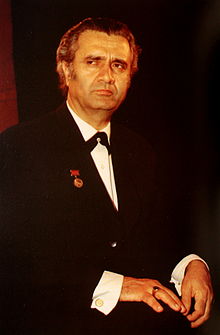Alexander Arutjunyan
Alexander Grigoryevich Arutyunyan , also Harut'yunyan , ( Russian Александр Григорьевич Арутюнян Alexander Grigoryevich Arutyunyan , Armenian Ալեքսանդր Գրիգորի Հարությունյան Aleksandr Harutyunyan Grigori * 23. September 1920 in Yerevan ; † 28. March 2012 ) was an Armenian composer in the USSR .
Career
Arutjunjan received his first piano lessons as a child and in 1934 began to study composition and piano at the Yerevan Conservatory . In 1941 he interrupted his studies and did not continue them until 1944 at the Moscow Conservatory (among others with Konstantin Igumnow and Nikolai Peiko ). He finished his studies in 1946 and returned to Yerevan the following year. In the following years he made a name for himself as a composer , especially with his cantata from home and his trumpet concerto. The trumpet concert in particular made him internationally known. 1954 Arutjunjan was appointed as a teacher for composition at the conservatory in Yerevan; In 1977 he was appointed professor. He also emerged as a pianist. Arutjunjan has received numerous awards throughout his career. In 1949 he received the Stalin Prize , and later he was appointed People's Artist of the USSR and Armenia . He also received, for example, the Orpheus Award ( Kentucky ) and in 2001 an Armenian State Order.
style
Although Arutjunjan's style is generally quite uniform, three periods can be identified in his work: first, a phase in which Armenian folk music played a major role together with a certain pathos, and from around the 1960s an increased turn to neoclassicism and characteristics of the Baroque and finally a synthesis of these two directions. Arutjunjan wrote a very independent music that shows diverse roots and influences. The folklore of his homeland was always important to him . At the same time, however, he was strongly connected to the Western European tradition by incorporating elements of the baroque and romanticism into his musical language. A special focus is on the concertante element; he knew how to put certain instruments in the limelight. Arutjunjan's music is also extremely vital, sometimes downright "musical" as well as very emotional: the range of emotions expressed is very large. In addition, his style is characterized by pronounced polyphony and memorable, folk melodies. Arutjunjan retained the context of an expanded, especially strong modal embossed tonality for always. His music does not cause any comprehension problems for the listener. Direct role models are difficult to identify because he had a pronounced personal style; in his oeuvre he is closest to Aram Chatschaturjan and Dmitri Kabalewski . Arutjunjan is the most important Armenian composer after Khachaturyan. In Germany, his brass concerts (especially the trumpet concerto) are primarily known.
Works
- Orchestral works
- Concert Overture (1944)
- Dance Suite (1952)
- Symphony in C minor (1957, rev. 1980)
- Sinfonietta for string orchestra (1966)
- Concerts
- Piano Concerto (1941)
- Trumpet Concerto (1950)
- Concertino for piano and orchestra (1951)
- Horn Concerto (1962)
- Theme and Variations for Trumpet and Orchestra (1973)
- Concertino for violoncello and small orchestra (1976)
- Oboe Concerto (1977)
- Flute Concerto (1980, rev. 2009)
- Violin Concerto "Armenia-88" for violin and string orchestra (1988)
- Trumpet Concerto (1991)
- Tuba Concert (1992)
- Elegy for trumpet and orchestra (2000)
- Vocal music
- "Cantata from Home" (1948)
- Concerto for soprano and orchestra (1950)
- "The saga of the Armenian people", Poem (1960)
- "Sajat-Nowa", opera (1967)
- "Ode to Lenin" for choir and orchestra (1967)
- Songs
- Choirs
- Chamber music
- String Quartet (1947)
- "Concert Scherzo" for trumpet and piano (1955)
- Viola Sonata "Retro" (1983)
- "Armenian Sketches" for brass quintet (1984)
- Sonata-Poem for violin and piano (1985)
- "Aria et Scherzo" for trumpet and piano (1987)
- Suite for oboe, horn and piano (1998)
- Piano music
- "Polyphonic Sonata" (1946)
- Sonatina (1967)
- "6 moods" (1976)
- other smaller pieces
- Cello music
- impromptu
literature
- Svetlana Sarkisyan: Harutyunyan, Aleksandr. In: Ludwig Finscher (Hrsg.): The music in past and present . Second edition, personal section, volume 8 (Gribenski - Hilverding). Bärenreiter / Metzler, Kassel et al. 2002, ISBN 3-7618-1118-7 , Sp. 763 ( online edition , subscription required for full access)
Web links
- Works by and about Alexander Arutjunjan in the catalog of the German National Library
- Alexander Arutyunyan in the Internet Movie Database (English)
- Official website ( Memento of July 14, 2010 in the Internet Archive ) (Armenian / Russian / English), accessed on July 25, 2018
Individual evidence
| personal data | |
|---|---|
| SURNAME | Arutjunjan, Alexander |
| ALTERNATIVE NAMES | Arutjunjan, Alexander Grigoryevich; Harutjunjan, Aleksandr Grigori |
| BRIEF DESCRIPTION | Soviet and Armenian composer |
| DATE OF BIRTH | September 23, 1920 |
| PLACE OF BIRTH | Yerevan |
| DATE OF DEATH | March 28, 2012 |
| Place of death | Yerevan |
